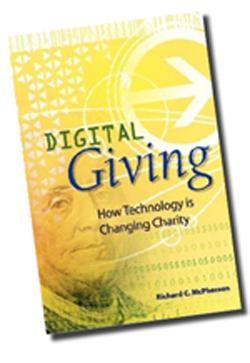Conversion of a techno-sceptic
- Written by
- Richard C McPherson
- Added
- June 03, 2009
Book review
Digital Giving: How technology is changing charity by Richard C. McPherson.
Reviewed for SOFII by Ken Burnett.

Only a few things in life are worth missing a flight for. I’d like to tell you about two of them. The first is merely amusing but the other, I think, you will find of more value.
The first was only the second flight I’d missed, ever. It was going to Oslo, Norway, but I was stuck on London’s Hammersmith roundabout, traffic at a standstill. Wife, Marie, and our two tiny sons were with me. Time ebbed away. In desperation after 30 vexing, stationary minutes I started a three-point turn, when a car from a side street moved in behind, to block me and everyone else. I was incandescent. I wound down my window to heap some choice Anglo-Saxon epithets upon the inconsiderate other driver. But mindful of youthful ears in the back what I said – or rather, shouted – was, ‘Well, thank you very much! That’s bloody brilliant. I mean, charming… That’s helped tremendously, hasn’t it? You’re a flaming genius, that’s what you are!’ Eventually I made my turn and we headed off in search for an alternative route, with steam coming out of my ears. The atmosphere in our car was tense, to say the least. Joe, aged four, stood up in the back and into the electric silence injected the immortal phrase, ‘Well, he seemed like a nice man…’
I missed the flight, but decided on reflection later that it was worth it, for Joe’s unintentional bon mots.
The second flight I missed more recently was supposed to leave from Hanoi, Vietnam. That I actually enjoyed missing it is thanks to some morebon mots, but this time they were intentional, not accidental and there were rather a lot more of them, though if I’m honest it wasn’t even slightly their fault that my flight was delayed. They just helped me to pass the time profitably. The words in question are those printed in Dick McPherson’s seminal book Digital Giving which I’d just started reading when the intercom informed me that technical difficulties in our plane had rendered it advisable that another one be sent out from Bangkok, heralding a delay of at least four hours.
I settled in for the long wait, hoping Dick’s book would make it pass more quickly. It didn’t (it’s not that good). But it did change my view of our profession’s future. In fact Dick, I am sure, is a flaming genius and deserves to be recognized by our industry as such, for he may just have a better handle on what’s round the corner technology-wise than anyone.
Other than advising you to buy it, there are just three things that I would like to pass on to you from all that I gathered from reading Digital Givingduring this enforced wait. There’s more in there, for sure, but you’ll just have to find further gems for yourself.
First, the author’s overall thesis that technology is irrevocably changing charities and vastly for the better is something that, until now, had barely registered with me. Like many techno-skeptics I choose to number myself among the Luddites but I’m coming out of this because at last in Dick McPherson I’ve found someone who can not only make technology understandable, he can make it sound helpful, urgent, accessible, even likeable and well worth getting to know better. Dick paints a picture of a nonprofit world transformed by increasingly democratic media and increasingly empowered audiences who will shape our organizations by demanding that we offer them what they want when and how they want it and in ways that appeal to them. This could be scary, but Dick shows why it is good and how the clever among us will recognize and ride the trends. Dick McPherson’s enthusiasm for technology shines through on every page of this book. You can picture him playing with his iPod, relishing interactive content and downloading webinars with glee as he checks out new online donor portals and makes a micro-loan to finance a Guatemalan shopkeeper and his family as they work their way out of debt, while Dick rubs his hands happily together at the thought of how quickly he’s had effective feedback on his gift and at how little overhead the whole transaction incurred.
The success of our nonprofits, Dick explains, increasingly depends on forces that are new. The shift is social and cultural. The old ways that we have clung to for so long will serve us no longer. We should embrace the brave new world.
But first, we need to understand it.
Second, I now understand that nonprofits have an automatic advantage in this new paradigm, which will be characterized by people-power and by free, limitless and relatively cheap communications platforms with content driven not by people with something to sell but by people who want to be in real control of what they buy. And what they use, share and support. This fits nicely into the perspective shift that all fundraisers need to make if they are really to score in building meaningful relationships with donors. It’s not about what your organization wants to say, it’s about what your donors are, or will be, prepared to hear. It’s not about what you want to promote or write about or broadcast or report, it’s about what they are willing to embrace, welcome, digest and absorb. I’ve been banging on for some time about nonprofits’ need to get really good both at listening and at telling stories, so they become expert in the art of communication. And so they will employ people properly trained in listening and communicating skills rather than our customary legions of generally well-intentioned, often not-very-gifted amateurs. According to McPherson, this is what our audiences are not just going to expect in the very near future, it’s what they’re going to demand. As WGBH’s Jon Abbott says in this book, we must ‘follow the rhythms of our consumers’. This advice has never been more apt.
Third, in this new hi-tech, hi-touch Shangri-la it’s the nonprofit that people recognize, like and trust that will scoop the big business. Of course content is important, as is the ability to communicate that content creatively, with power and passion. But however much the world changes and however adroitly you and your organization change to keep pace, there are some things that you will change only at your peril; that if you are wise you’ll preserve at all costs.
As a nice footnote to all this Dick advises that a real – and quick – hard copy old-fashioned style thank you note is still de rigueur for all donations, online or otherwise. Some things just don’t change, whatever technology does. But for me the message is simple. If technology is inevitable, lie back and enjoy it. And if Dick and the people he interviews in Digital Giving are to be believed, technology seems likely to be going my way. For the foreseeable future, at least.
Yes, on reflection this was also worth missing my flight for, just as son Joe’s comments were, all those years ago on the road that should have led to Oslo. But of course I could easily have read McPherson’s book on the flight. Hanoi to Bangkok is about 90 airborne minutes. This book isn’t long, just 101 pages. Curses! And I thought I had done so well…
© Ken Burnett 2009
First published in Contributions Magazine
About Ken Burnett
 Ken Burnett is author of Relationship Fundraising and other books including The Tiny Essentials of an Effective Volunteer Board (The White Lion Press Limited, Kermarquer, France) and The Zen of Fundraising, (Jossey-Bass Inc, San Francisco.).
Ken Burnett is author of Relationship Fundraising and other books including The Tiny Essentials of an Effective Volunteer Board (The White Lion Press Limited, Kermarquer, France) and The Zen of Fundraising, (Jossey-Bass Inc, San Francisco.).

















